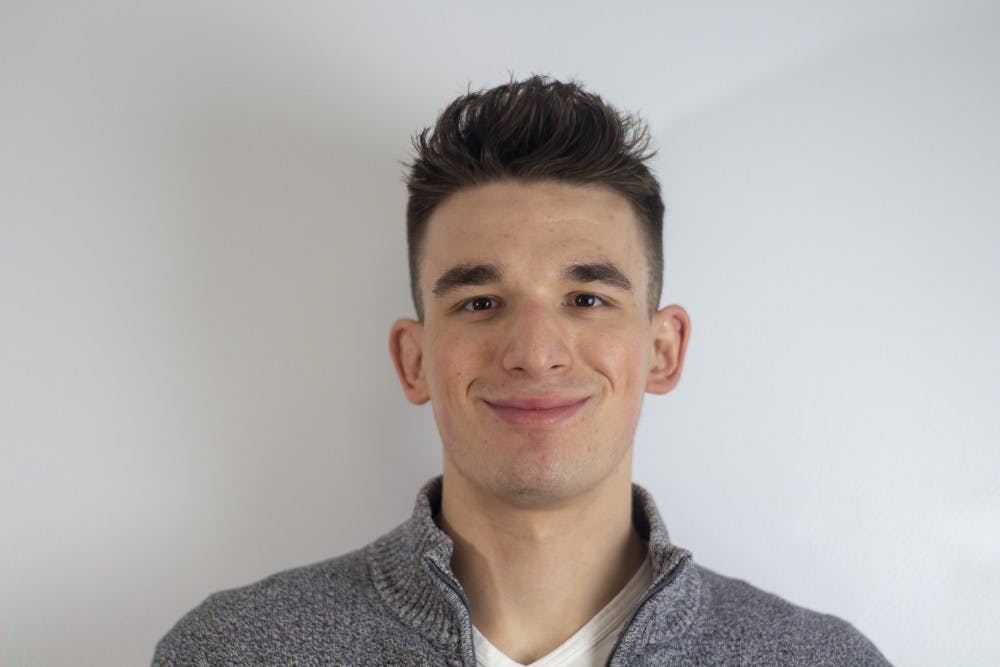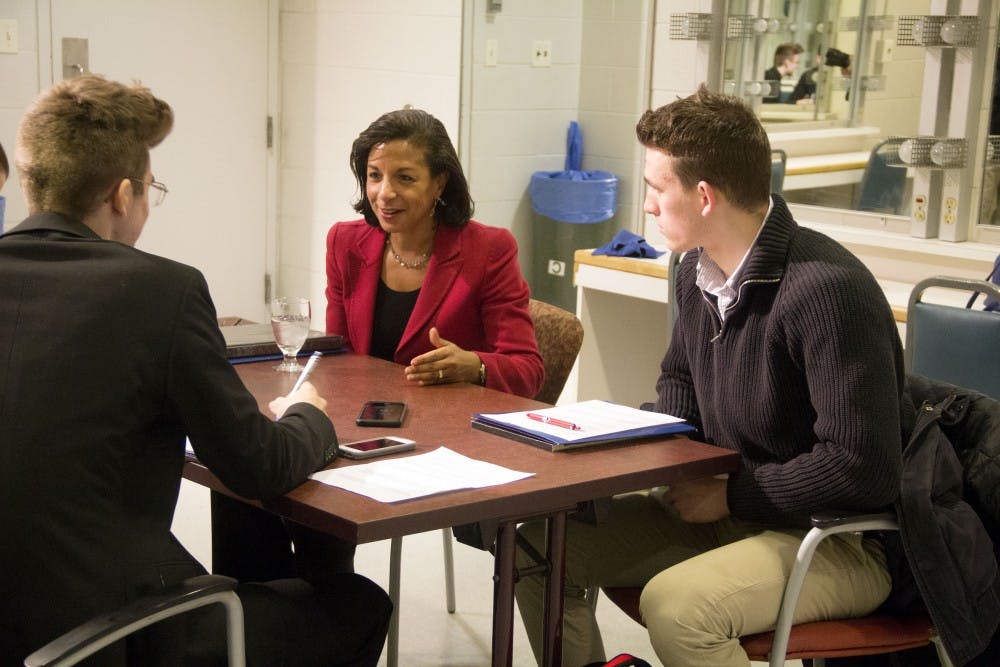As a force in the White House under two administrations, Susan Rice was present for some of the most combative times in modern politics.
Ahead of her Wednesday night appearance at this year’s Distinguished Speaker Series, the former National Security Adviser sat down with The Spectrum.
Q: Working for both the Clinton and Obama administrations, can you describe the transition? What differed most in terms of working with each president?
A: Well, my exposure to each was quite different. I was much more junior working for President Clinton, even though I did know him well and I did have interaction with him. But, working with President Obama as his National Security Advisor in particular was an experience where you’re meeting almost every day and you’re involved in some of the toughest decision making processes. President Obama is a massive consumer of written material. He reads everything. So, we would put a lot of effort not just into his daily briefing, but also every memo for information or decision that he received. He could consume the memo, and he wouldn't have to reprise what was in it. He would absorb it and then was asking a second and third order question and probing the weaknesses in your arguments. The bottom line is, he is extremely smart, and therefore very hard to staff because he’s liable to be a couple steps ahead of even his smartest staffer. He’s also very thoughtful; he absorbs all of the information and asks difficult questions. For some of the more consequential decisions, he will often say “let me sleep on it,” and come back in the morning with a decision. He’s also very interested in the views of experts, so he wasn’t just only wanting to know “what does my Secretary of State think?” or “what does my National Security Advisor think?” Rather, he wanted to know what the guys who wrote the memos think. He was challenging to staff because of the quality of his intellect, but very rewarding to do so. Temperamentally, what you see in public is what you get in private. He doesn’t fly off the handle or lose his temper if he’s unhappy, even angry; he’s very very calm. Almost too calm. President Clinton is also very smart. A different kind of smart, but very smart. I often wondered if President Clinton almost had a photographic memory. He had that kind of recall, and I have no basis for knowing that; it was just something that occurred to me when I was working with him. Again, not working as intimately with him as I did with President Obama, it’s a little bit hard to make comparisons. [President Clinton] would chew on issues longer and he might engage in extended discussion and debate about something. His style was maybe a little less buttoned down than President Obama’s, but they were both very smart people that challenged staff in a good way to produce.
Q: As someone who held the National Security Advisor position for three-and-a-half years, do you think you’d personally be capable of working with President Trump?
A: Well, I’ll never have to answer that question. And honestly, I only know President Trump the way you all do through watching him from far and not after he was elected have I ever had an encounter with him. It was very much briefly and kind of in a social setting. I think it would be challenging for me from what we know in the public domain about how he consumes information. He doesn’t seem to be a reader for the most part and he takes his information orally, which is fine, but given the complexity of the issues and all of the considerations that go into making smart decisions on national security. If the president were making a very consequential decision, he’d be reading a five to seven page single spaced decision memo often. With the legal ramifications and policy considerations and the risks and all this stuff thoroughly laid out. It’s hard to convey all of that with the same degree of granularity if you’re just briefing somebody orally. I think that would be challenging for me. I too like to read, and I like to have a real grasp of the issues that I’m wrestling. I think also it would be a real challenge, and I feel for my successor, that, with President Obama, when we agreed to do something or say X or Y, he would say X or Y. We wouldn’t be sitting on pins and needles wondering what the heck was going to come out of the President’s mouth. We had statements and speeches that he would certainly adlib, but he would adlib within the boundaries of what we all agreed made sense and particularly what he agreed made sense, and he would’ve signaled that to us in advance. I think that, particularly the use of Twitter in the way that we’ve seen it, but the more off-the-cuff approach of President Trump and even off-the-cuff in ways that contradict what his senior advisoes have said would be really hard to manage and, I’m just speculating, would create a lot of frustration.
Q: President Trump’s firing of former Director of the FBI James Comey sparked intense debate over his use of power. What are the potential repercussions of Trump firing Special Counsel Mueller? If he were to fire the special council, do you think Republican support would wane or remain consistent?
A: I think it would be disastrous for him to fire Mueller and stupid. I think it would cause a constitutional crisis, and I think it would reinforce the perception that there may be some obstruction. He shouldn’t have done it once, doing it twice is crazy. I hope that he won’t. Do I think Republicans would react as one might think they should? That is the $64,000 question. I’ve been disappointed, to be candid, with how few Republicans have publicly voiced their concerns. Privately, they’ll be much more candid but they won’t take him on publicly. Few will take him on publicly.
Q: I saw that you recently became a contributing opinion writer at the New York Times. Do you feel sharing your voice is important today? What advice do you have for young people looking to participate and preserve democracy?
A:Yes, I feel that my voice and all voices of experience, whatever their background, are useful in a time of uncertainty and when I think people are concerned about the direction of U.S. foreign policy and the nature of our leadership in the world. In my case, I couldn’t just hide under a rock and not say anything. For young people what I urge, above all, is active engagement. Do not sit home and fail to vote. You’ve got to vote in midterms, you’ve got to vote in local elections, you’ve got to vote in presidential elections. You can’t just ebb on social media and comment or complain. I’m so admiring and proud of these students in Florida and the movement that they’ve galvanized nationally. I’m glad it’s around gun control, but it really could’ve been around anything that they were passionate about and it felt existential to them. To me, that shows what young people can do when they’re motivated and organized. Three weeks ago, who saw this coming? Who would’ve thought that after enduring such an extraordinary trauma, their reaction would be to become very outspoken and public and effective using all the tools at their disposal. So I think it’s a great model. Not everybody needs to be on national television every day, but it shows you the power of young people when they’re organized and committed. You can’t just be there for the rallies and the marches and the protests and the commentary on Twitter. You’ve got to vote, and you’ve got to organize people to vote. When young people vote, it makes a difference and when they don’t, it makes a difference. For me, sitting in the job that I had ... it’s disappointing to do the kind of work that I did and then feel like, even though young people care about the outcomes, they’re not doing the basic things they need to do to affect the outcomes logistically.
Email: arts@ubspectrum.com

Brenton J. Blanchet is the 2019-20 editor-in-chief of The Spectrum. His work has appeared in Billboard, Clash Magazine, DJBooth, PopCrush, The Face and more. Ask him about Mariah Carey.
Brian Evans is a senior English major and The Spectrum's senior arts editor.






